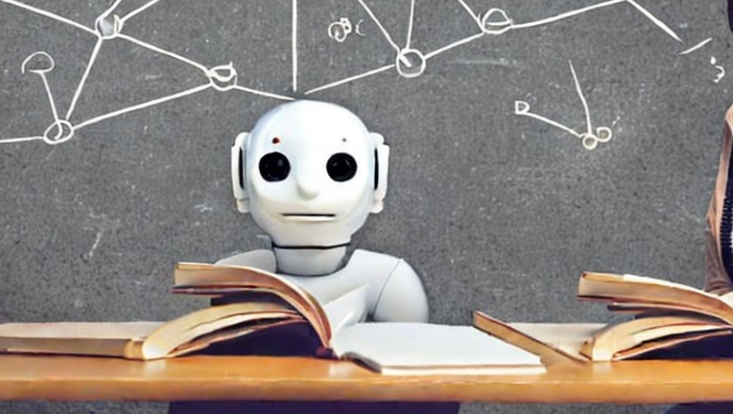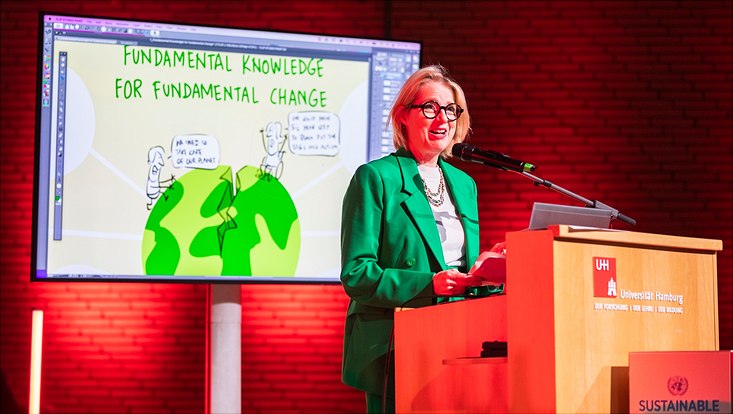Artificial intelligence in the context of education“ChatGPT is just the Tip of the Iceberg”
2 March 2023, by Jannis Mueller

Photo: UHH/EW
The machine-learning based dialog system ChatGPT knows all the answers and can type them out for those who ask. What does that mean for learning and education, what are the opportunities and challenges? Prof. Dr. Ann-Katrin van den Ham, Junior Professor for Educational Science with a focus on Methods in Empirical Research and Prof. Dr. Ingrid Lohmann, Professor for Ideas and Social History in Education, talk on the new hot topic of artificial intelligence chatbots.
What does ChatGPT mean for the educational environment in general?
Prof. Dr. van den Ham: On the one hand, given the significant social and economic implications of AI, we have to assume that the topic will become part of our teaching plans. Ultimately, AI like ChatGPT will influence what the workplace will look like in the future. Similarly in this context we have to ask ourselves what skills can be provided by the education system and confirmed by the qualifications it provides. The fact that AI like ChatGPT can take over the pure reproduction of knowledge clearly shows again that having this as an educational goal and examination focus is insufficient, and emphasizes the relevance of skills like critical thinking.
Prof. Dr. Lohmann: ChatGPT is just the tip of the iceberg. AI-based tools are going to change all aspects of life, from the health system, to legal advice, to the entertainment industry and all kinds of economic activity. Speed is also a factor here. The first one to use an opportunity is going to have a massive advantage that others may not be able to make up for later. The opportunities are huge, but won’t last long as there are entire markets to corner. The battle has already started and we will see whether ChatGPT and Microsoft can stay out in front, or whether Google will catch up with Bard, particularly in terms of the costs of use, copyright, privacy, and data protection.
What opportunities does ChatGPT open up?
Prof. Dr. van den Ham: ChatGPT can take care of run of the mill daily activities, saving time and resources. For example, it can help to generate material in simplified language, summarize texts, generate tasks and exercises, and assist when programming and fixing code, etc. However, this requires that the users have the required skills to work with this tool, to ask the right question or prompts and reflect on the output and assess its content.
Prof. Dr. Lohmann: To understand the opportunities, we have to consider that in principle, anyone using AI tools can produce just about anything, from programming through to whole video games, without knowing how to write a line of code themselves. We can already see that ChatGPT can program. And there are AI-based tools that can create whole videos in response to simple prompts in real time. While the result still looks quite simplistic, in a few years, the quality will reach that of films you see in the cinema.
It makes me think of the science-fiction novel The Diamond Age by Neal Stephenson from the 90s, subtitled “A young lady’s illustrated primer,” which is actually a coming of age novel. The illustrated primer is a fictive AI device, no bigger than a tablet, developed according to the most advanced technology and morals, which answers all the questions posed by the young user, Nell, and helps her make sense of her world. The vision could be to provide personalized education for all learners, driven by such AI-based “primers.” The educational system could, providing it has the required money, time, and access, make the dream of Czech philosopher Comenius’ dream come true, to make all knowledge available to everyone in a broad range of ways.
Does contemporary learning look different now?
Prof. Dr. Lohmann: AI is definitely going to change the way we learn. How exactly, can be discussed in light of activity theories following the tradition of cultural-historical approaches founded by Wygotski, Leontjew, Lurija, and others. This theoretical approach takes up the question of development and use of cultural tools and looks like a good starting point. Generally, we need a circular construction of knowledge, skills, and judgment to structure the acquisition of knowledge. And time to try it all out. That doesn’t change anything, particularly not when the individuals doing the learning have themselves become the subjects of knowledge.
Prof. Dr. van den Ham: ChatGPT offers new opportunities for learning. As we have said, learners can ask questions and find out more about complex topics by asking more and more targeted follow-up questions. And ChatGPT can solve tasks and also write texts. That makes it all the more important to focus on learners' motivation and to consistently address it. For example, we need to highlight the advantages of “writing it yourself.” In addition, the ability to critically evaluate and revise texts also comes to the fore.


